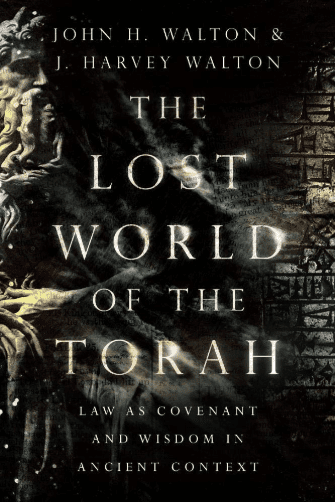 John Walton’s “Lost World” series continues with his newest book, with his son J. Harvey Walton, The Lost World of the Torah.
John Walton’s “Lost World” series continues with his newest book, with his son J. Harvey Walton, The Lost World of the Torah.
When one of these books comes out, I open to the Table of Contents and read each of his Propositions. It’s easy to get a skim of the whole this way; he’s not hiding anything with chp titles to make readers wait for the good stuff to come. He just tells you up front what he will be arguing.
There are 23 Propositions in this book, we looked at 1-4 last week and today I want to continue at Proposition 5.
Their essential strategy is to locate the Bible in its historical contexts, and that means the Torah is part of the Ancient Near East (ANE). It is not 1st Century; it is not Roman law; it is not modern constitutional law. The Waltons fight anachronisms all the time. Fighting anachronisms can at times lead to missing continuities.
So far W&W have argued the Torah of the OT is wisdom, not law/legislative. It’s about order, not legislation. The ANE collections of seeming laws were “aspective” and not comprehensive. It is right that W&W cut a path: to be legislation it has to be comprehensive. Thus, “We will use the term legislation to refer to the idea of legal formulations that are prescriptive and therefore create a system of law and an obligation for those under that system.” It sure seems to me that no legislation in any culture has ever been comprehensive; laws are always aspective: they are aspects of life out of which some kind of legal ruling is made that is to shape how other judges are to judge and how humans in that culture are to live. But no legislation, not even Justinian’s massive Digest is comprehensive. W&W: “If a society is going to be governed by law, the law must address every aspect of society.” (How do we know that? Who says so? Can law ever be comprehensive? Doesn’t all law develop and evolve and shift and accrue new rulings, which then become precedence?) I’m not sure using “comprehensive” over against “aspective” says as much as W&W contend.
Now to our post for today.
5 The Torah Is Similar to Ancient Near Eastern Legal Collections and Therefore Also Teaches Wisdom, Not Legislation
The laws of Exodus, Leviticus, Deuteronomy — they are contending — are aspective; they are for judges and kings as precedents for how to rule and judge further; they are then wisdom and not legislation. I’m sure they are wisdom; I’m not sure the negation follows or is necessary.
One of the strategies of W&W is to provoke thought; part of that strategy is to write in strong affirmation-denial. This shocks readers into attention, the way Barth often did. It also creates some bewildering false dichotomies, but I will give them a break: it’s a strategy and rhetoric that does need some nuancing.
Yes, the rulings of the OT are not comprehensive (and for them not legislation therefore), but this point is important:
… the Torah, though clearly recognized as a document (“book of Moses”), is not relied on as the legal, normative basis for judicial decisions. So, for example, David reacts to Nathan’s parable with, “As surely as the Lord lives, the man who did this must die! He must pay for that lamb four times over, because he did such a thing and had no pity” (2 Sam 12:5-6). Exodus 22:1 can be cited as attesting to the custom that theft of a sheep should be repaid fourfold, but there is no indication that David had re searched the law in order to arrive at his decision, nor did he substantiate it based on a legal text. Texts that contain legal sayings may at times have been read aloud as exhortation to the people (as in Deut 31:10-13; Ezra 8), consulted by judges, or studied by kings who sought to be wise (Deut i7:i8-2o). The Torah was intended to give the king wisdom for doing his job.
Now another logical move in this book: these rulings that were valuable for judges and kings to provide wisdom for social order are then incorporated into the OT as a covenant and the rulings in a covenant become, not legislation, but covenant stipulations. As such, they provide order for covenant people on how to live as covenant people to bring good reputation (glory) to God. They are thus not legislation. (Why not both?)
The Hebrew terms — like mishpatim etc — are terms reflecting aspective judgments, not comprehensive codification, which is the mark of legislation.
Torah presents the way of wisdom and life (Deut 30) in the ordered world of the covenant. We can therefore see that the issues that Scripture addresses have to do with wisdom and covenant fidelity, not with legislation and its rules that must be obeyed.
Consequently, we will propose that Torah in biblical usage is an expression of wisdom, not of legislation. It refers to a collection of examples that combine to form a description of the desired established order. We will be using the term to refer to the corpus of legal sayings found throughout the Pentateuch and will seek to demonstrate that these sayings embody standards of wisdom for the ordering of society within the covenant relationship that Yahweh had with Israel.
6: The Israelite Covenant Effectively Functions as an Ancient Near Eastern Suzerainty Treaty
Drawing out what has already been said, and important for the case W&W build, is that the “laws” of the Torah are embedded in a covenant, one that is very much on the order of a suzerainty treaty. To use their terms, “ANE treaty stipulations are aspective, not comprehensive, and their intention is instruction, not legislation.” Again, this rhetoric gets too close to dichotomous thinking. The aim is loyalty not legal obedience, and the overall aim is to enhance the reputation of the suzerain (God). “The kings of the ancient world did not impose law; they gave wisdom as they forged their identity.”
Both legal wisdom texts and treaties serve to establish or enhance the reputation of the king who produced them. In the case of the legal wisdom, the text establishes wisdom and justice and thereby serves to demonstrate that the king is wise and just. In the case of treaties, the document establishes the parameters of a relationship that will demon the treatment of his vassals.
liis in turn indicates that when we turn to apply the message of Israels covenant documents to ourselves, we should think in terms of trying to understand the reputation that Yahweh intended to establish for himself. We should not think in terms of something that Yahweh wants to give to us (law) or something that he expects to receive from us (moral performance).
7: Holiness Is a Status, Not an Objective
Holiness is something about God — about God-ness. It is not something humans achieve but a status God gives. Rhetoric again: “Holiness does not describe a property of Israel; it describes a property of Yahweh.”












